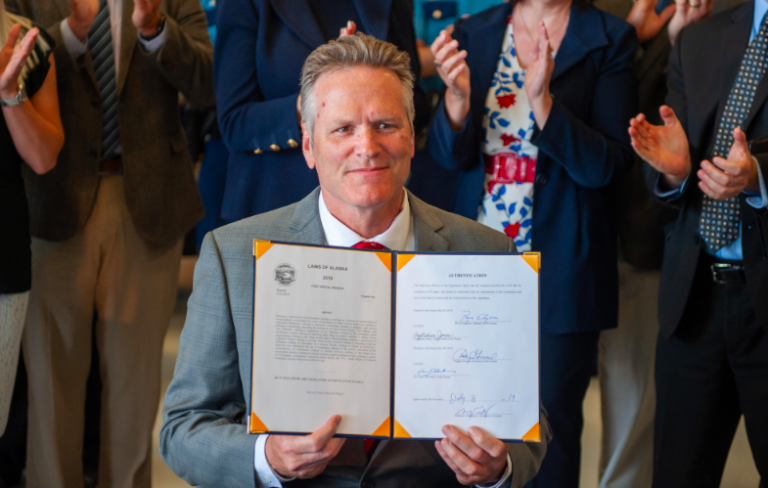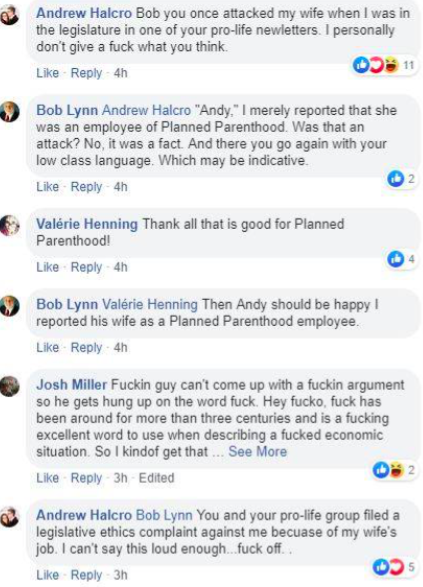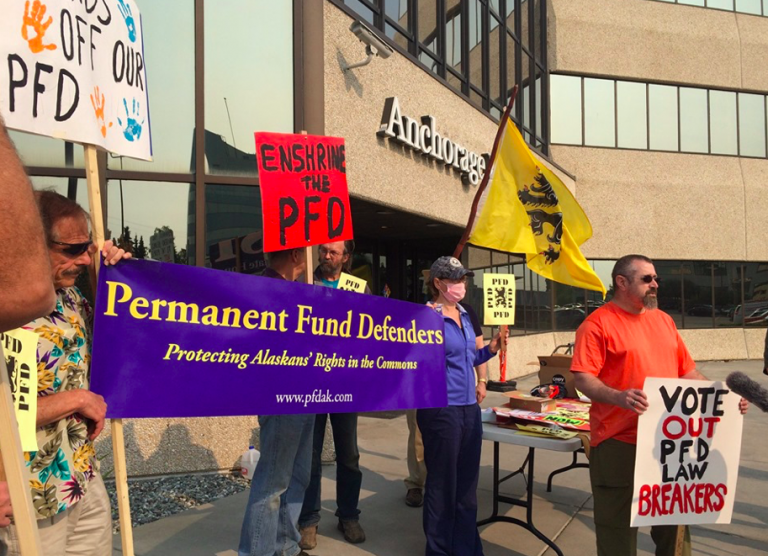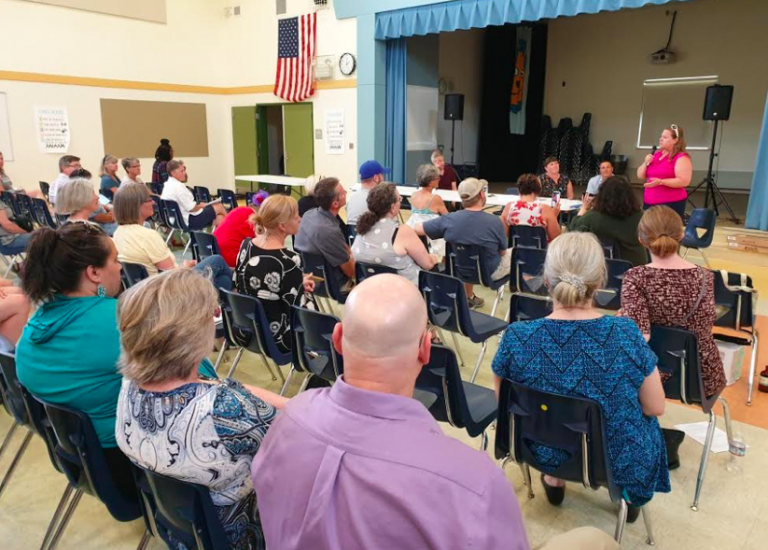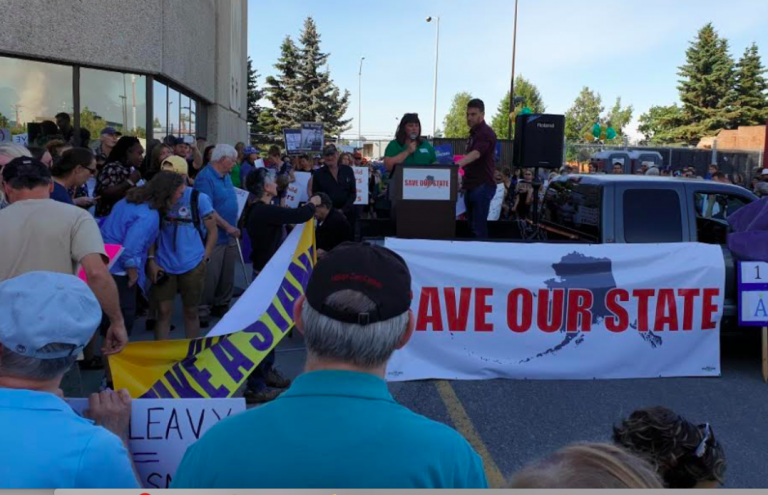While the Alaska Legislature had a wholly unproductive day working in two “sessions,” 800 miles apart, Gov. Michael J. Dunleavy fulfilled one of his campaign promises and signed into law House Bill 49, which repeals the legislation many Alaskans know as SB 91 — legislation that had been signed by Gov. Bill Walker that made Alaskans feel unsafe in their own homes.
HB 49 effectively repeals and replaces the law that led to a crime wave across Alaska during the Walker Administration. It strengthens sentencing for many categories of felonies, and gives judges back the discretion they need when deciding bail conditions. It also dramatically corrects the former “catch and release” revolving door.
“Alaska’s crime statistics have gone through the roof as verified by the FBI and members of our own administration. Our property crimes are higher than most places in the United States. Our sexual assault rates are unspeakable. We have one of the highest murder rates in the country. But that’s going to change with the advent of this bill being signed today,” said Dunleavy at the bill signing ceremony at the Department of Public Safety Lake Hood Hangar. “This isn’t going to fix it all, this is just the beginning. This is going to allow the thin blue line, Troopers, corrections, local police, all of law enforcement- it’s going to give them the tools to catch these criminals, hold these criminals, prosecute these criminals, and sentence these criminals.”
During his first address to the Legislature in January, Dunleavy reiterated his intent to get tough on crime.
“If you are a criminal, this is going to be a very dangerous place for you, starting now,” he said in his State of the State Address. “I suggest you get out while you can. No more coddling, no more excuses. Your days are over.”
Today, he reiterated that theme:
“To the criminals, I mentioned this in the State of the State speech: this is not your time, and this is the time to get out of the state. With signing this bill, we’re serious. If you’re going to try any prey on Alaskans we’re coming after you, we will prosecute you. If you hurt Alaskans, if you molest children, if you assault women, we’re really going to come after you. This has got to end,” Dunleavy said.
Watch the bill signing ceremony and listen to the remarks here:
“I want to thank everyone that worked on this bill, this was a huge effort by stakeholders across the spectrum, folks of the administration, but also folks in the legislature. I want to thank each and every legislator that worked on this bill and voted for this bill. Through your actions, Alaska is going to be a much safer place going into the future,” he said.
He noted that HB 49 was a collaborative effort with his team, including law enforcement officers; victims of crime and advocacy groups, prosecutors, and a bipartisan group of Legislators. Many of the criminal justice reforms signed into law today were part of the package of criminal justice reforms that Governor Dunleavy proposed earlier this year.
A few of the changes include:
Sex Offenses:
- Sexual Assault in the Second and Third Degree – Changes the required mental state from “knowing” to “reckless” when the offender engages in penetration (sexual assault in the second degree) and sexual contact (sexual assault in the third degree) with a victim who is mentally incapable, incapacitated, or unaware that the sexual act is being committed.
- Sexual Abuse of a Minor Sentencing – Makes sexual abuse of a minor in the third degree a sexual felony when there is a 6 year age difference, thus increasing the sentencing range from 0-2 to 2-12 years.
- Indecent Exposure – Makes indecent exposure when the offender masturbates in the presence of an adult a class C felony and a class B felony if the offender masturbates in the presence of a person under 16 years of age.
- Unlawful Exploitation of a Minor – Makes unlawful exploitation of a minor an unclassified felony if the person has been previously convicted of exploitation of a minor or the victim is under 13 years of age. Unlawful exploitation of a minor is currently a class B felony upon the first conviction and a class A felony if the person has been previously convicted.
- Presumptive Sex Offense Sentencing – Clarifies that any prior felony counts as a prior felony for presumptive sentencing purposes in sex cases. This means prior felonies, even when they are a non-sex felony, trigger an increased presumptive range for a sex offense.
- Out Of State Sex Offender Registration – Requires anyone convicted of a registerable sex offense in another state to register in Alaska if they are present in the Alaska.
- Indecent Viewing – Makes indecent viewing or production of a picture of a child and production of a picture of an adult a registerable sex offense and sentenced as a sexual felony. Conduct involving the viewing of a picture of an adult would be a class A misdemeanor.
- Soliciting Sex From A Minor – Deletes “online” from the crime of “online enticement of a minor” making any solicitation of a minor for sex a B felony.
- Unwanted Images Of Genitalia – Makes repeatedly sending unsolicited and unwanted images of genitalia to another person harassment in the second degree (B misdemeanor).
- Marriage Defense to Sexual Assault – Repeals marriage as a defense to sexual assault except in cases where there is consent and the conduct is illegal due to the nature of the relationship but-for the marriage (probation officer/probationer, peace officer/person in custody, DJJ officer/person 18 or 19 an under the jurisdiction of the Division of Juvenile Justice).
Drug Possession and Distribution:
- Drug Possession – Makes it a felony to possess the most dangerous controlled substances upon the second conviction. (e., heroin, methamphetamine, cocaine, PCP, etc.). A 10-year look back period is added for drug offenses.
- Drug Distribution – Returns distribution of most dangerous drugs to class B and A felonies from the current C and B levels and removes quantity as an element.
- Methamphetamine Manufacturing and Distribution – Re-enacts the statutes combatting methamphetamine manufacturing and distribution.
Classification and Sentencing:
- A Misdemeanor Sentencing – Remove 30-day presumptive sentence for A misdemeanors and returns discretion to judges to impose 0-365 days. Also increases the sentencing range for B misdemeanors from 0-10 days to 0-90 days.
- Threats – Creates a generalized terroristic threatening statute to address threats of harm even when not a false threat such as school shootings.
- Felony sentences – Increases felony sentencing from current law.
- Probation Lengths – Increases the maximum probation length for sex felonies to 25 years and 10 years for all other offenses.
- Failure to Appear – Removes the 30 day grace period for FTA to ensure better enforcement for defendants appearing in court for the hearings, including trial.
- DUI Mandatory EM for 1st – Eliminates electronic monitoring or house arrest as being mandatory for 1st DUI returning discretion back to the commissioner of the department of corrections.
- ASPIN Use At Grand Jury – Allows APSIN (rap sheet) to be used at grand jury when an element of the offense requires proof of prior convictions.
- Involuntary Commitments – Requires the Alaska Court System to transmit information regarding involuntary commitments that have occurred since January 1, 2011 to the Department of Public Safety.
- Driving While License Suspended– allows for first-time incidents involving an administrative suspension will be a violation. The sentence for subsequent administrative suspension and all court revocations will remain a class A misdemeanor.
- Disorderly Conduct– disorderly conduct remains a class b misdemeanor, but for a first offense, a term of imprisonment shall not exceed 72 hours. All subsequent offenses up to 10 days.
Pretrial:
- Keeps current Pretrial Services Program except – Removes presumption of release from the risk assessment tool. Discretion is given back to the judge.
- Adds language that a person may request a bail review hearing based on inability to pay only if the person can show that they made a good faith effort to post required bail.
- Increase Use of Video-Teleconferencing – Encourages the use of videoconferencing for all pretrial court hearings.
- Treatment While Out on Pretrial Release – Caps the amount of jail credit that can be awarded to a defendant who does treatment while on pretrial release at 365 days.
Probation and Parole:
- Caps on Sanctions for Technical Violations and Absconding – Repeals the caps on the sanctions for technical violations (currently 3, 5, and 10 days for the first three violations respectively) and absconding (up to 30 days). Returns discretion to judges and the parole board to impose a sanction appropriate for the offender, the type of violation, and the underlying offense.
- Earned Compliance Credits –Reduces the accrual to 1/3 of their probation or parole time and prohibits sex offenders, unclassified offenders, those convicted of felony crimes against a person, and a domestic violence crime against a person from participating in the program.
- Early Termination Of Probation And Parole – Returns to a true recommendation of the probation or parole officer instead of a mandated recommendation after 1 or 2 years without violation.
- Discretionary Parole– requires that the board consider suitability for parole of a prisoner who is eligible for discretionary parole if the prisoner had no disciplinary action imposed during incarceration. However, if the prisoner did have disciplinary action imposed, they would then have to apply to be considered for discretionary parole. This returns discretion to the board for those whose behavior while incarcerated may indicate a danger to themselves or the public if released.
- Parole Eligibility – Returns to restricting what crimes are eligible for discretionary parole. Makes the following crimes ineligible:
- Non-sex class A felonies (Robbery 1, Assault 1, Arson 1, Escape 1, MIW 1);
- B felonies if the person had one or more prior felony convictions; ***except for manslaughter
- C felonies if the person had two or more prior felony convictions; and
- B and C sex felonies (Sexual Assault 2, Sexual Abuse of a Minor 2, Distribution of Child Pornography).
- Note: Unclassified and class A sex felonies have always been ineligible for discretionary parole.
- Parole Release Presumptions – Returns discretion to the parole board by eliminating a presumption of release.
- Good Time For Electronic Monitoring – Eliminate reduction of sentence using good time calculation while on electronic monitoring
